 W
WAmericanah is a 2013 novel by the Nigerian author Chimamanda Ngozi Adichie, for which Adichie won the 2013 U.S. National Book Critics Circle Award for fiction. Americanah tells the story of a young Nigerian woman, Ifemelu, who immigrates to the United States to attend university. The novel traces Ifemelu's life in both countries, threaded by her love story with high school classmate Obinze. It was Adichie's third novel, published on May 14, 2013 by Alfred A. Knopf. A television miniseries, starring and produced by Lupita Nyong'o, was in development for HBO Max.
 W
WAnthills of the Savannah is a 1987 novel by Nigerian writer Chinua Achebe. It was his fifth novel, first published in the United Kingdom 21 years after Achebe's previous one, and was credited with having "revived his reputation in Britain". A finalist for the 1987 Booker Prize for Fiction, Anthills of the Savannah has been described as the "most important novel to come out of Africa in the [1980s]". Critics praised the novel upon its release.
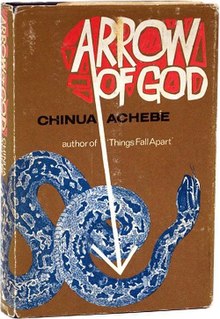 W
WArrow of God, published in 1964, is the third novel by Chinua Achebe. Along with Things Fall Apart and No Longer at Ease, it is considered part of The African Trilogy, sharing similar settings and themes. The novel centers on Ezeulu, the chief priest of several Igbo villages in colonial Nigeria, who confronts colonial powers and Christian missionaries in the 1920s. The novel was published as part of the influential Heinemann African Writers Series.
 W
WBeasts of No Nation is a 2005 novel by the Nigerian-American author Uzodinma Iweala, that takes its title from Fela Kuti's 1989 album with the same name. The book was adapted as a movie in 2015.
 W
WThe Bride Price is a 1976 novel by Nigerian writer Buchi Emecheta. It concerns, in part, the problems of women in post-colonial Nigeria. The author dedicated this novel to her mother, Alice Ogbanje Emecheta.
 W
WChike and the River is a children's story by Chinua Achebe. It was first published in 1966 by Cambridge University Press, with illustrations by Prue Theobalds, and was the first of several children's stories Achebe would write. The latest reprint has a cover design by Victor Ekpuk.
 W
WEfuru is a novel by Flora Nwapa which was published in 1966 as number 26 in Heinemann's African Writers Series, making it the first book written by a Nigerian woman, in fact, any African woman, to be published internationally. The book is about Efuru, an Igbo woman who lives in a small village in colonial West Africa. Throughout the story, Efuru wishes to be a mother, though she is an independent-minded woman and respected for her trading ability. The book is rich in portrayals of the Igbo culture and of different scenarios which have led to its current status as a feminist and cultural work.
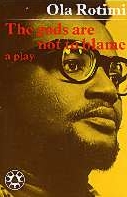 W
WThe Gods Are Not To Blame is a 1968 play and a 1971 novel by Ola Rotimi. An adaptation of the Greek classic Oedipus Rex, the story centres on Odewale, who is lured into a false sense of security, only to somehow get caught up in a somewhat consanguineous trail of events by the gods of the land.
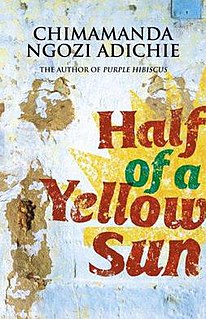 W
WHalf of a Yellow Sun is a novel by Nigerian author Chimamanda Ngozi Adichie. Published in 2006 by Knopf/Anchor, the novel tells the story of the Biafran War through the perspective of the characters Olanna, Ugwu, and Richard.
 W
WThe Interpreters is a novel by Wole Soyinka, first published in London in 1965 and later republished as part of the influential African Writers Series. It is the first and one of the only two novels written by Soyinka; he is principally known as a playwright. The novel was written in English and later translated into a number of languages.
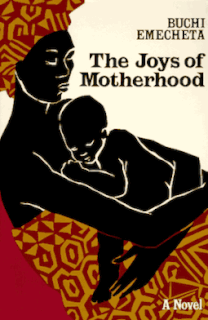 W
WThe Joys of Motherhood is a novel written by Buchi Emecheta. It was first published in London, UK, by Allison & Busby in 1979 and was reprinted in Heinemann's African Writers Series in 2008. The basis of the novel is the "necessity for a woman to be fertile, and above all to give birth to sons". It tells the tragic story of Nnu-Ego, daughter of Nwokocha Agbadi and Ona, who had a bad fate with childbearing. This novel explores the life of a Nigerian woman, Nnu Ego. Nnu’s life centres on her children and through them, she gains the respect of her community. Traditional tribal values and customs begin to shift with increasing colonial presence and influence, pushing Ego to challenge accepted notions of "mother", "wife", and "woman". Through Nnu Ego’s journey, Emecheta forces her readers to consider the dilemmas associated with adopting new ideas and practices against the inclination to cleave to tradition. In this novel, Emecheta reveals and celebrates the pleasures derived from fulfilling responsibilities related to family matters in child bearing, mothering, and nurturing activities among women. However, the author additionally highlights how the ‘joys of motherhood’ also include anxiety, obligation, and pain.
 W
WLokotown and Other Stories is a collection of nine short stories by Nigerian author Cyprian Ekwensi, published in 1966 as the 19th volume in the African Writers Series. Looking at Nigerian city life, his stories show excitement and dissolution.
 W
WThe Looming Fog is the 2006 debut novel by the Nigerian writer, Rosemary Esehagu. The story follows the life of an intersex child as they struggle to live in a pre-colonial village in Nigeria that considers the anomaly an abomination.
 W
WA Man of the People (1966) is a novel by Nigerian writer Chinua Achebe. Written as a satirical piece, A Man of the People follows a story told by Odili, a young and educated narrator, on his conflict with Chief Nanga, his former teacher who enters a career in politics in an unnamed fictional 20th century African country. Odili represents the changing younger generation; Nanga represents the traditional West African customs, inspired by that of Achebe's native Nigeria. The book ends with a military coup, similar to the real-life coup organized by Major Chukwuma Kaduna Nzeogwu, Major Adewale Ademoyega, Major Emmanuel Ifeajuna, Captain Chris Anuforo, Major Donatus Okafor, and Major Humphrey Chukwuka.
 W
WMy Life in the Bush of Ghosts is a novel by Nigerian writer Amos Tutuola, published in 1954. It is presented as a collection of related - but not always sequential - narratives.
 W
WNo Longer at Ease is a 1960 novel by Nigerian author Chinua Achebe. It is the story of an Igbo man, Obi Okonkwo, who leaves his village for an education in Britain and then a job in the Nigerian colonial civil service, but is conflicted between his African culture and Western lifestyle and ends up taking a bribe. The novel is the second work in what is sometimes referred to as the "African trilogy", following Things Fall Apart and preceding Arrow of God. Things Fall Apart concerns the struggle of Obi Okonkwo's grandfather Okonkwo against the changes brought by the English.
 W
WOne Man, One Matchet was written by Nigerian author T. M. Aluko and published in 1964 as the 11th book in the Heinemann African Writers Series. The novel tells the story of a community in Western Nigeria during the end of the colonial period and beginning of independence. Set in a small community where the majority of the inhabitants are dependent on the revenue from their cocoa crops, the story looks at the role of the semi-literate Benjamin Benjamin in the small community.
 W
WThe Palm-Wine Drinkard is a novel published in 1952 by the Nigerian author Amos Tutuola. The first African novel published in English outside of Africa, this quest tale based on Yoruba folktales is written in a modified English or Pidgin English. In it, a man follows his brewer into the land of the dead, encountering many spirits and adventures. The novel has always been controversial, inspiring both admiration and contempt among Western and Nigerian critics, but has emerged as one of the most important texts in the African literary canon, translated into more than a dozen languages.
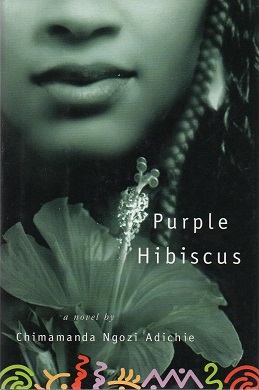 W
WPurple Hibiscus is a novel written by the Nigerian author Chimamanda Ngozi Adichie. Her debut novel, it was first published by Algonquin Books in 2003.
 W
WThe Slave Girl is a 1977 novel by Nigerian writer Buchi Emecheta that was published in the UK by Allison and Busby and in the US by George Braziller. It won the Jock Campbell Award from the New Statesman in 1978. The novel was Emecheta's fourth book; it was dedicated to her editor Margaret Busby.
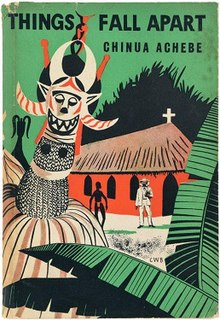 W
WThings Fall Apart is the debut novel by Nigerian author Chinua Achebe, first published in 1958. Its story chronicles pre-colonial life in the southeastern part of Nigeria and the arrival of Europeans during the late 19th century. It is seen as the archetypal modern African novel in English, and one of the first to receive global critical acclaim. It is a staple book in schools throughout Africa and is widely read and studied in English-speaking countries around the world. The novel was first published in the UK in 1962 by William Heinemann Ltd., and became the first work published in Heinemann's African Writers Series.